Pelosi In Israel Says Iran Nuclear Program A Threat To World
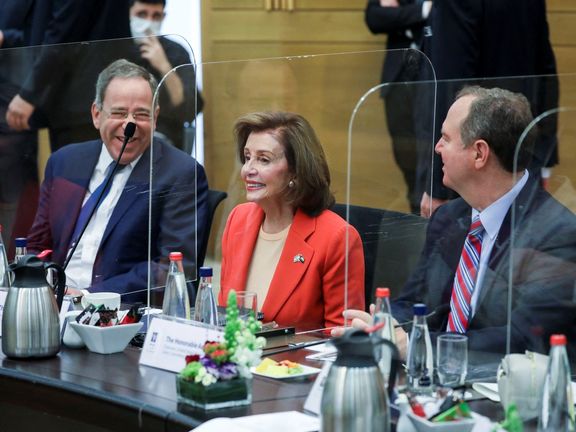
US House of Representatives Speaker Nancy Pelosi says Israel's proximity to Iran is a threat to all of us and the responsibility of all of us.

US House of Representatives Speaker Nancy Pelosi says Israel's proximity to Iran is a threat to all of us and the responsibility of all of us.
Pelosi, along with a delegation of Democratic members of Congress arrived in the country on Tuesday as part of her first official visit to Israel in over two years and in Vienna with Knesset members on Wednesday.
"It's a threat to the world. Israel's proximity to Iran is a threat to all of us and the responsibility of all of us", she stressed.
Pelosi -- who once lauded the 2015 nuclear deal as a diplomatic masterpiece – said, "We are together in the fight against terror posed by Iran and its nuclear development”.
Pelosi said relations between the Knesset and Congress were critical, and signed the guestbook of the Knesset's Chagall Hall, writing that the security ties between Israel and the US are stable and strong, and that “our friendship is eternal.”
Knesset Speaker Mickey Levy, who greeted Pelosi, thanked her in particular for congressional approval of funding for the Iron Dome missile defense system, saying, “The passage of the law to fund the replenishment of the Iron Dome system will forever be associated with you... The State of Israel could not have asked for a better friend."
Pelosi said the formation of the State of Israel is the greatest accomplishment of the 20th century, noting that the US is proud to have Israel as an ally and will continue supporting its security and stability.
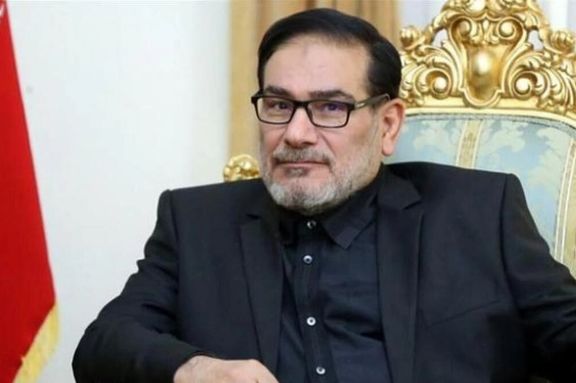
Iran's national security chief says the United States and its European allies have failed to live up to their commitments under the 2015 deal, rendering the JCPOA an empty shell.
Ali Shamkhani wrote in a Persian tweet on Wednesday that the nuclear deal between Iran and the world powers did not bring about any economic benefits for Iran or lift sanctions on the country.
He added that the Islamic Republic will not engage in any negotiations with “oath-breaker America” and “idle Europe.”
As the Iranian negotiating team is engaged in bilateral and multilateral talks with the participants of the Vienna talks, Shamkhani has been sounding negative about the negotiations in recent days and insisting on the removal of all sanctions imposed since 2018 when former US president Donald Trump left the JCPOA.
Shamkhani said last week, “Previous experience has shown that without effective lifting of sanctions, sustainable economic benefits from JCPOA are an illusion.”
The Biden Administration has indicated it is willing to lift nuclear-related sanctions imposed since 2018, but Iran is demanding the removal of other sanctions related to human rights, banking and export violations.
While officials say the eighth round of the Vienna talks is in its concluding stages, another meeting was held Tuesday night between Iranian negotiators, the European Troika, and the representative of the European Union.
Iran’s chief negotiator Ali Bagheri also held a bilateral meeting with the EU coordinator for negotiations Enrique Mora.
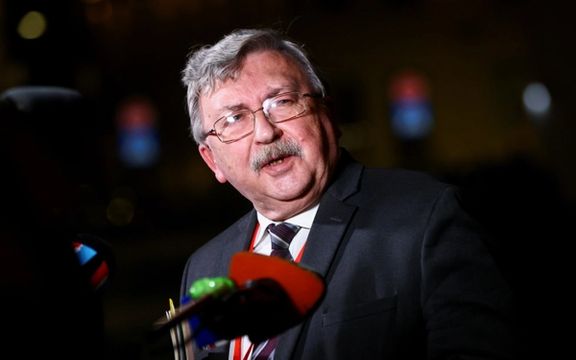
Iranian commentators have been expressing concern about the impact of the Ukraine-Russia crisis on Iran's nuclear negotiations with world powers in Vienna.
Mohsen Jalilvand has said in an interview with Aftab News website that Iran might fall victim to the Ukrainian developments and stressed that the only way to prevent this is holding direct talks with the United States rather than counting on Russia as a mediator between Tehran and Washington. Meanwhile, Jalilvand warned that Russia might take advantage of the situation.
The commentator agreed with Aftab News that a Russian attack on Ukraine seems to be inevitable and such an attack can leave a destructive impact on the Islamic Republic's diplomacy in Vienna. He said that Belarus, China and Iran support Russia in the conflict with Ukraine.
Jalilvand said that a war in Ukraine will lead to the total collapse of the negotiations in Vienna. He added that Russia might also use the Iran card in Vienna adding that "Russia might sell Iran out for concessions."
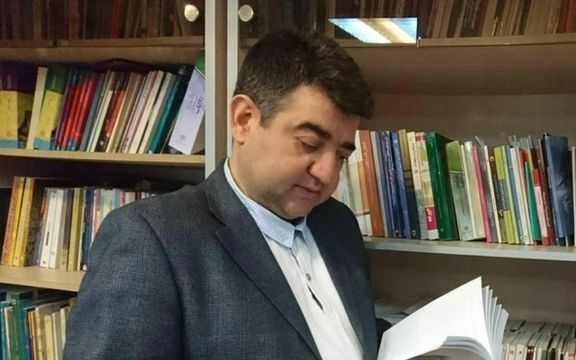
Meanwhile, Foreign Policy Commentator and former diplomat Kourosh Ahmadi said in an interview with Entekhab news website that the United States might soften its position in the Vienna negotiations to have more time to focus on the possibility of a Russian attack on Ukraine.
But he disagreed with Jalilvand on how far a Russian attack can impede talks in Vienna. He said the impact of the Ukrainian crisis on the nuclear negotiations is likely to be minimal and lead to minor disruptions and delays. He added that both the United States and Russia have said before that they have shared interests in the revival of the JCPOA.
Ahmadi reminded that the 2014 occupation of the Crimea took place in the middle of Iran's nuclear negotiations with the P5+1. But the overall impact on the negotiations was minimal. "Whatever Moscow's position, it cannot have a determining impact on the nuclear talks.," Ahmadi said.
Ahmadi said that it is unlikely that the Ukrainian crisis would lead to an all-out classic war. "It is more likely to be a limited operation like what happened in 2014, and not like the occupation of Afghanistan in 1979," he said.
Furthermore, he doubted that Iran would openly support such an attack, reminding that Tehran has not endorsed the 2014 Russian occupation of the Crimea.
He added that "if Iran and America have the political will to come to an agreement, other JCPOA member states can only be facilitators. Otherwise, they will be marginalized. On the other hand, Russia cannot afford not to be part of a possible agreement in Vienna." Ahmadi added that during the past three months Russia has always tried to moderate Iran's positions in Vienna.
In another development, reformist website Zeitoon quoted the former head of the Iranian Parliament's National Security and Foreign Relations committee Heshmatollah Falahatpisheh as saying that the Russians are using Iran as a “barrier” in their confrontation with the West over Ukraine.
Falahatpisheh said: "Based on its interests, Russia is using Iran as a barrier in its confrontation with the United States. Moscow is likely to sell the JCPOA for Ukraine. However, Iranian officials wrongly believe that China and Russia are Iran's strategic allies. This comes while strategic alliance does not mean anything in today's world."
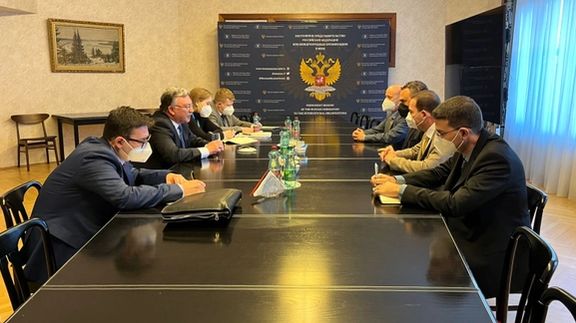
Russian envoy in Iran nuclear talks Mikhail Ulyanov has said that in his meeting with a visiting Israeli delegation in Vienna there was no discussion over Iran.
In an interview with Iran International TV, Ulyanov said that the two sides “disagree on the JCPOA, so there was nothing to discuss” about the Iran nuclear talks.
The Russian envoy, who has taken an active role in the Vienna negotiations, said “We discussed the UN Conference on WMD-Free Zone in the Middle East, where all other regional states participate, except for Israel.” He added, “We maintain regular dialogue with Israeli counterparts.”
The Israeli delegation, headed by Joshua Zarka, the foreign ministry’s deputy director general for strategic affairs, met Tuesday with Ulyanov, Russia’s top negotiator in the Vienna talks, and Monday with Rafael Grossi, director-general of the International Atomic Energy Agency (IAEA).
The visit by the Israeli delegation was seen as an attempt to gauge the state of the talks as diplomats insist the process in its final and critical stage. The United States has warned that time is running out if an agreement is not reached soon.
Israel opposes the revival of the JCPOA, which it believes would be insufficient to stop Tehran from acquiring nuclear weapons and would result in the removal of US sanctions, giving Iran a financial lifeline.
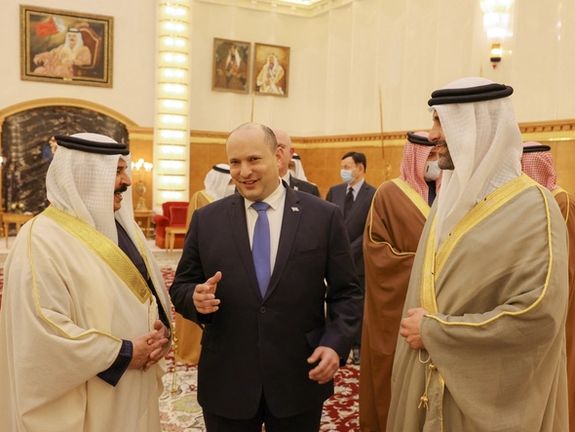
Bahrain's Crown Prince Salman bin Hamad Al-Khalifa has accepted an invitation from Prime Minister Naftali Bennett to visit Israel in "the near future.”
Abdullatif Al-Zayani, the Bahraini foreign minister, announced the plan during the visit to the kingdom Tuesday of Israeli Prime Minister Naftali Bennett, which Al-Zayani said had included discussions of the "Iranian nuclear file and terrorism."
Bennett said he was seeking a “new regional architecture” with Arab Gulf states – referring principally to Bahrain and the United Arab Emirates, who in 2020 normalized relations with Israel – against "enemies who are fomenting chaos and terror."
Bennett portrayed his two-day trip largely as a common stance against Iran and its allies, including Yemen's Ansar Allah, known as the Houthis, whose battle in Yemen against Saudi- and UAE-led forces has spilled over this year into missiles fired at the UAE.
Bahraini opposition activists said Tuesday that at least four people had been arrested in protests against Bennett’s visit in several villages inhabited by Shia, who make up the majority in the country ruled by the Sunni Khalifa family. Bahrain, which crushed protests in 2011 with Saudi help, blames unrest on Tehran.
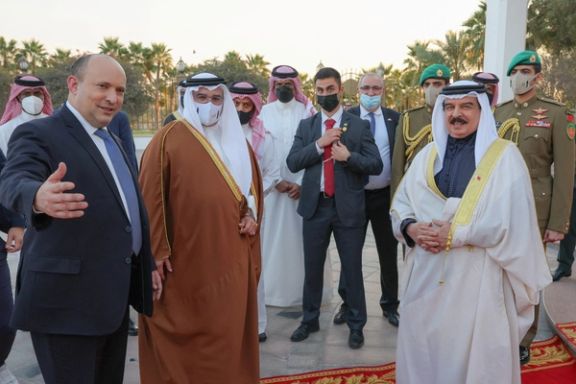
After meeting King Hamad bin Isa Al Khalifa, Bennett stressed the importance of a variety of links that have mushroomed between Israel and some Arab Gulf states since the 2020 ‘normalization.’ "We don't have enough trade, we don't have enough tourism - and that is what this visit is all about," Bennett said. "I'm going to be your ambassador there (in Israel). I want to 'sell Bahrain'.”
The two sides announced a research and development accord and that talks would continue on facilitating investment flows. Bahrain’s has severe fiscal problems with public debt running at around 130 percent of GDP. A bilateral security accord reached in February could give Bahrain access to controversial Israeli technology used to monitor dissidents.
Israel’s Growing Military Role
The proposed visit to Israel by Crown Prince Salman will irk the Palestinians, who see ‘normalization’ as a betrayal of their aspiration for a state. Qatar this month reiterated its support for a Palestinian state as a precondition for ‘normalization,’ the stance agreed in the 2001 Saudi-drafted Arab Peace Initiative.
Bennett’s visit Tuesday to the Bahrain base of the US Navy’s Fifth Fleet highlighted Israel’s growing military role in the Persian Gulf. A US official said Tuesday the navy was considering adding unmanned Israeli boats to its joint regional operations and was also interested in Israeli-made drones.
Officials also said Israel would become the 29th country to post an attaché to the fleet's Manama headquarters. Meeting Fleet commander Vice-Admiral Brad Cooper Tuesday, Bennett said he expected "the cooperation among the region's countries and powerful ally the United States will keep getting closer.”
After the warm relationship between former Israeli premier Benjamin Netanyahu and former US president Donald Trump, Israel’s relationship with the US has been strained by its leaders’ continued opposition to the 2015 Iran nuclear deal, which world powers including the US are trying to revive in talks with Iran in Vienna.

Over a month after Richard Nephew left the US negotiating team in Vienna, he has published a series of tweets to elaborate on the reasons behind his move.
Nephew, who is known as the architect of Washington’s sanctions on Iran, was serving as the deputy to US especial envoy to Iran Robert Malley until December 6, when he left the US negotiating team along with two others, over what was reported as differences with Malley at the time.
In a series of tweets on Tuesday, Nephew said he stepped down from his post “due to a sincere difference of opinion concerning policy”, adding that he no longer serves in the State Department since last week and intends to return to academia.
“Although my views and record have been and continue to be mischaracterized by quite a few people, I do not intend to convey any further details at this time or in public, given the ongoing nature of discussions in Vienna”, he added.
Advocating a tougher posture, Nephew, along with two other US negotiators, left the team because the Biden administration failed to achieve a more assertive approach in the talks, the Wall Street Journal reported.
Nephew, who is a non-resident Senior Fellow at the Brookings Institution, published a book about the sanctions in 2017, titled The Art of Sanctions: A View from the Field.